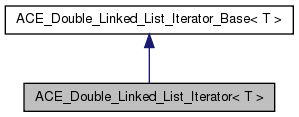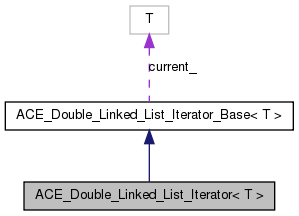Implements an iterator for a double linked list ADT. More...
#include <Containers_T.h>


Public Member Functions | |
| ACE_Double_Linked_List_Iterator (const ACE_Double_Linked_List< T > &) | |
| void | reset (ACE_Double_Linked_List< T > &) |
| int | first (void) |
| int | advance (void) |
| T * | advance_and_remove (bool dont_remove) |
| ACE_Double_Linked_List_Iterator < T > & | operator++ (void) |
| Prefix advance. | |
| ACE_Double_Linked_List_Iterator < T > | operator++ (int) |
| Postfix advance. | |
| ACE_Double_Linked_List_Iterator < T > & | operator-- (void) |
| Prefix reverse. | |
| ACE_Double_Linked_List_Iterator < T > | operator-- (int) |
| Postfix reverse. | |
| void | dump (void) const |
| Dump the state of an object. | |
Public Attributes | |
| ACE_ALLOC_HOOK_DECLARE | |
| Declare the dynamic allocation hooks. | |
Implements an iterator for a double linked list ADT.
Iterate thru the double-linked list. This class provides an interface that let users access the internal element addresses directly. Notice {class T} must declare ACE_Double_Linked_List<T>, ACE_Double_Linked_List_Iterator_Base <T> and ACE_Double_Linked_List_Iterator as friend classes and class T should also have data members T* next_ and T* prev_.
| ACE_Double_Linked_List_Iterator< T >::ACE_Double_Linked_List_Iterator | ( | const ACE_Double_Linked_List< T > & | dll ) |
| int ACE_Double_Linked_List_Iterator< T >::advance | ( | void | ) |
Move forward by one element in the list. Returns 0 when all the items in the list have been seen, else 1.
Reimplemented in ACE_DLList_Iterator< T >.
| T * ACE_Double_Linked_List_Iterator< T >::advance_and_remove | ( | bool | dont_remove ) |
Advance the iterator while removing the original item from the list. Return a pointer points to the original (removed) item. If dont_remove equals false, this function behaves like {advance} but return 0 (NULL) instead.
| void ACE_Double_Linked_List_Iterator< T >::dump | ( | void | ) | const |
Dump the state of an object.
Reimplemented in ACE_DLList_Iterator< T >.
| int ACE_Double_Linked_List_Iterator< T >::first | ( | void | ) |
Move to the first element in the list. Returns 0 if the list is empty, else 1.
| ACE_Double_Linked_List_Iterator< T > & ACE_Double_Linked_List_Iterator< T >::operator++ | ( | void | ) |
Prefix advance.
| ACE_Double_Linked_List_Iterator< T > ACE_Double_Linked_List_Iterator< T >::operator++ | ( | int | ) |
Postfix advance.
| ACE_Double_Linked_List_Iterator< T > ACE_Double_Linked_List_Iterator< T >::operator-- | ( | int | ) |
Postfix reverse.
| ACE_Double_Linked_List_Iterator< T > & ACE_Double_Linked_List_Iterator< T >::operator-- | ( | void | ) |
Prefix reverse.
| void ACE_Double_Linked_List_Iterator< T >::reset | ( | ACE_Double_Linked_List< T > & | dll ) |
Retasks the iterator to iterate over a new Double_Linked_List. This allows clients to reuse an iterator without incurring the constructor overhead. If you do use this, be aware that if there are more than one reference to this iterator, the other "clients" may be very bothered when their iterator changes. @ Here be dragons. Comments?
Reimplemented from ACE_Double_Linked_List_Iterator_Base< T >.
| ACE_Double_Linked_List_Iterator< T >::ACE_ALLOC_HOOK_DECLARE |
Declare the dynamic allocation hooks.
Reimplemented from ACE_Double_Linked_List_Iterator_Base< T >.
 1.7.2
1.7.2